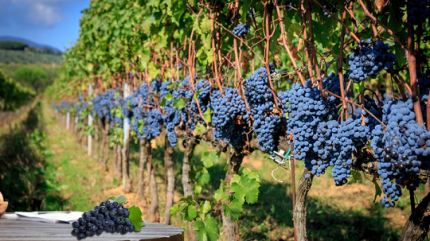
The European Commission plans more help with surpluses, investment to tackle climate change and “clear” marketing rules as part of new measures to support the EU wine industry.
The new proposal, announced on Friday (28 March) aims to help vintners in the bloc tackle ongoing challenges such as climate change, changing consumer trends and “market uncertainties”.

Discover B2B Marketing That Performs
Combine business intelligence and editorial excellence to reach engaged professionals across 36 leading media platforms.
Some of these proposed policy shifts include supporting EU member states with the removal of excess or unnecessary vines, and removing unripe grapes before harvest, also known as “green harvesting”. The move looks to help prevent wine surplus and “protect producers from financial strain”.
The Commission has also proposed to provide vintners with “additional flexibility” around replanting authorisation schemes.
The proposed changes to the wine policy framework follow on from recommendations issued in the High-Level Group on Wine Policy report in December.
In addition to grubbing up schemes, the report recommended “flexible” management systems for planting vines and replanting authorisations, as well as mechanisms to adjust grape yields.

US Tariffs are shifting - will you react or anticipate?
Don’t let policy changes catch you off guard. Stay proactive with real-time data and expert analysis.
By GlobalDataTo help wine growers become more resilient to climate risks, the report also advised the EU looked at insurance schemes to help vintners in the face of extreme weather. Rules within the EU’s Common Agricultural Policy and on state aid should also be adapted, it said.
In its latest proposal, the Commission said it is looking to boost the maximum financial assistance Brussels provides to “up to 80% of the eligible investment costs” for spending intended to go towards developing and using mitigative actions against climate change.
Christophe Hansen, the EU Commissioner for Agriculture and Food, said: “I am confident that our proposals will help stabilise the market and will enable the producers to seize new opportunities and respond to evolving consumer expectations. I invite the member states and the European Parliament to act swiftly towards the final adoption and implementation of these measures to bring relief to the sector.”
The proposal will need to be negotiated with the European Parliament and Council. If an agreement is reached, the Commission’s proposals can then be adopted into EU law. The Commission did not confirm when a verdict on the proposals might be reached.
Changes would also include simplifying the marketing of “innovative products”, by developing “clearer rules and common product denominations” for lower abv wines throughout the single market.
Other proposed measures include creating a “harmonised labelling” system for wines across the bloc, receiving support for building up wine tourism in areas protected by geographical indication and extending the length of EU-funded promotional campaigns in third countries from three to five years.
EU wine trade body Comité Européen des Entreprises Vins (CEEV) said it supported the changes but cautioned the package did not prepare the sector for a potential trade war between the bloc and the US.
Ignacio Sánchez Recarte, secretary general of CEEV, said: “It is a good legal package and we stand ready to working with the Commission, the European Parliament
and the Council to fine tune the proposal. An expedited adoption is necessary.”
He added: “However, the wine package will fall short if a trade war involving wine erupts between the EU and the US. Even though the 200% tariffs on EU wines have not been applied, the closure of the US wine market to our wines is already a reality, as importers have halted all shipments for fear of the potential tariffs. This is costing EU wine companies €100m ($108.1m) per week. An urgent solution is needed – wine must not be held hostage to unrelated trade disputes.”



